SPOTLIGHT
How waste pickers in PE navigate the lockdown and hunger
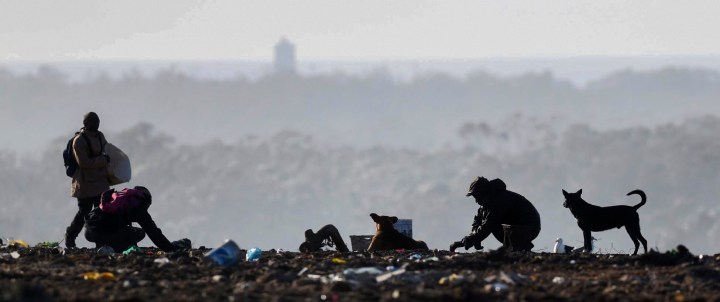
For Zukisa Pikini of Uitenhage, the landfill site is the only way of surviving. ‘Without this dump, I won’t be able to feed my family. It’s better to come here and search for food instead of sleeping with an empty stomach.’ Spotlight spoke to waste pickers about their fears of contracting Covid-19 and to experts about the risks of this happening.
At the Arlington and Uitenhage waste disposal sites in Port Elizabeth, hundreds of people search daily for recyclable materials to sell and for food to eat. Martin Witbooi from Walmer is one of them.
He tells Spotlight personal protective equipment (PPE) is “a luxury”. “We normally wash and wear gloves, and masks that we get from industrial waste. Otherwise, without those trucks from industrial areas, we have to make our makeshift masks with clothing. As a result, some of us see no point in wearing gloves or masks every time we carry out our duties.”
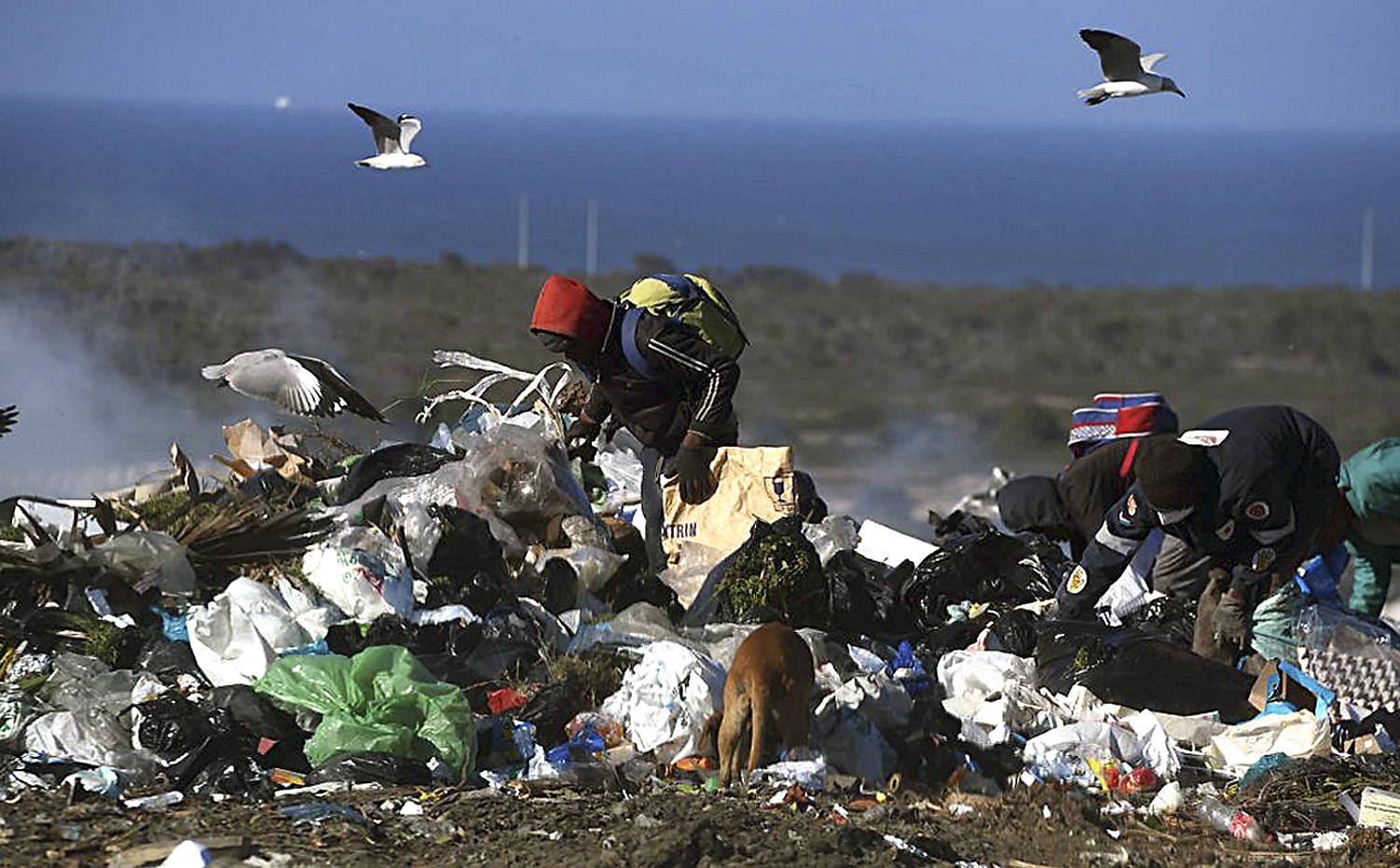
Martin Witbooi from Walmer (lime green backpack) says PPE is a luxury. (Photo: Black Star / Spotlight)
The 31-year-old father of two tells Spotlight many people (working at the Arlington landfill site) “are afraid of Covid-19, but it is virtually impossible for us not to get this virus because we are exposed to it”. “Even right now we don’t know who has this virus as people here are always coughing and complain of fever and chest pains. If we are not yet infected, we literally survived by the grace of Jesus Christ.”

A woman happy for the bread she could salvage. (Photo: Black Star / Spotlight)
Covid-19 rates in the area are soaring. At 30,603 (as of 2 July 2020), the Eastern Cape has the third most confirmed cases of South Africa’s nine provinces – and most of those cases are clustered around Nelson Mandela Bay.
What is the Covid-19 risk from waste?
“Now that 95% of people who tested positive for Covid-19 are being kept at home, the waste they are generating consists of personal protective equipment,” says Professor Angela Mathee, Director of the Environmental Health Research Unit at the South African Medical Research Council (SAMRC).
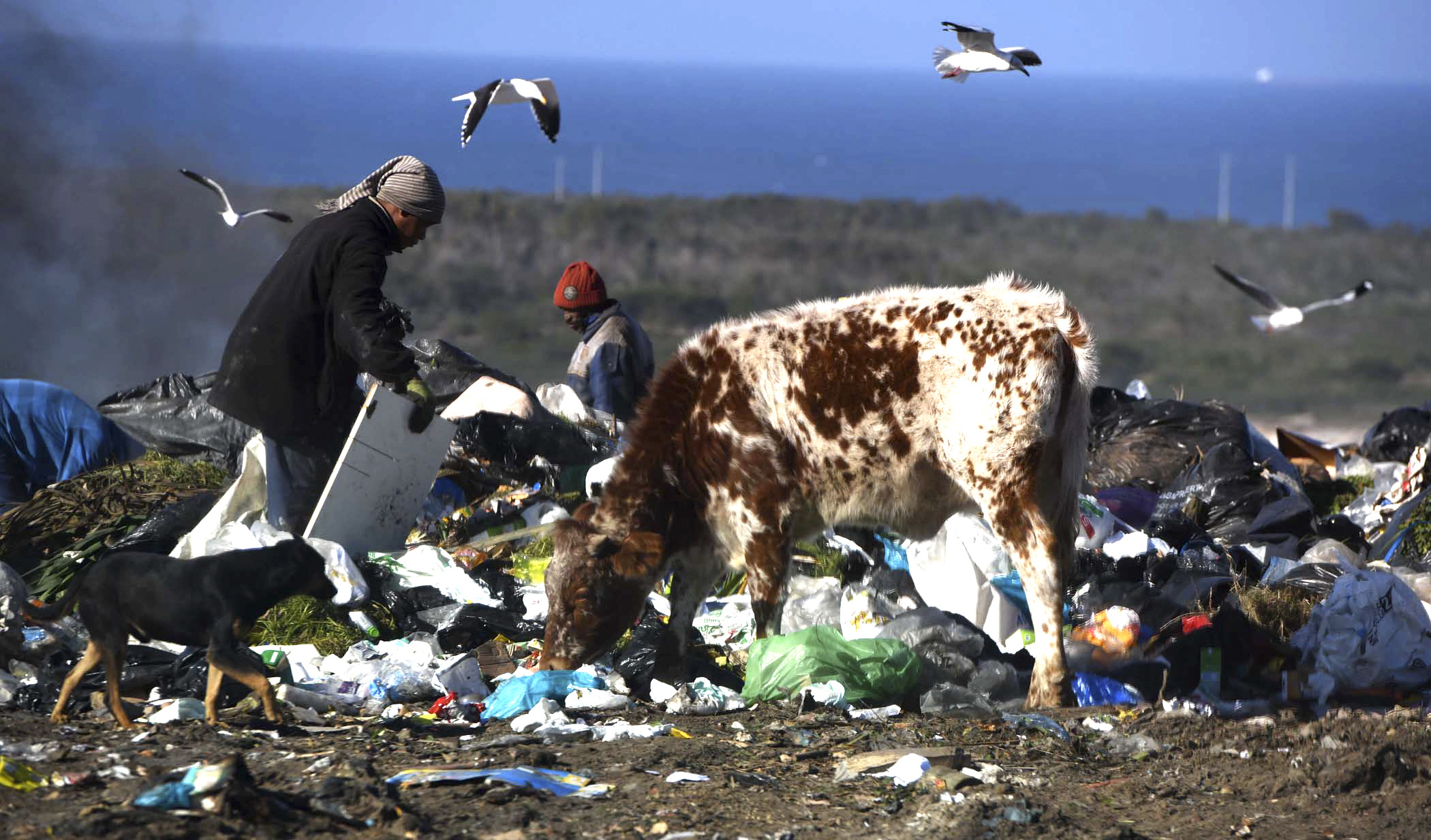
Hundreds of waste pickers spend their days at landfill sites in Nelson Mandela Bay rummaging through mountains of garbage, often with bare hands. (Photo: Black Star / Spotlight)
Mathee says the used PPE could end up at landfill sites which can pose some risk for people rummaging through waste, but the risk from most types of waste is small.
Head of the Division of Medical Virology at Stellenbosch University Professor Wolfgang Preiser says that studies show that in controlled settings (like a laboratory), the virus remains infectious for between hours to several days, depending on factors including the type of surface, temperature and moisture.
“But there are also studies that have looked for virus ‘survival’ (which means testing whether the virus on the surface will actually infect cell cultures in the laboratory) and found that under special circumstances, it can ‘survive’ for several days.”
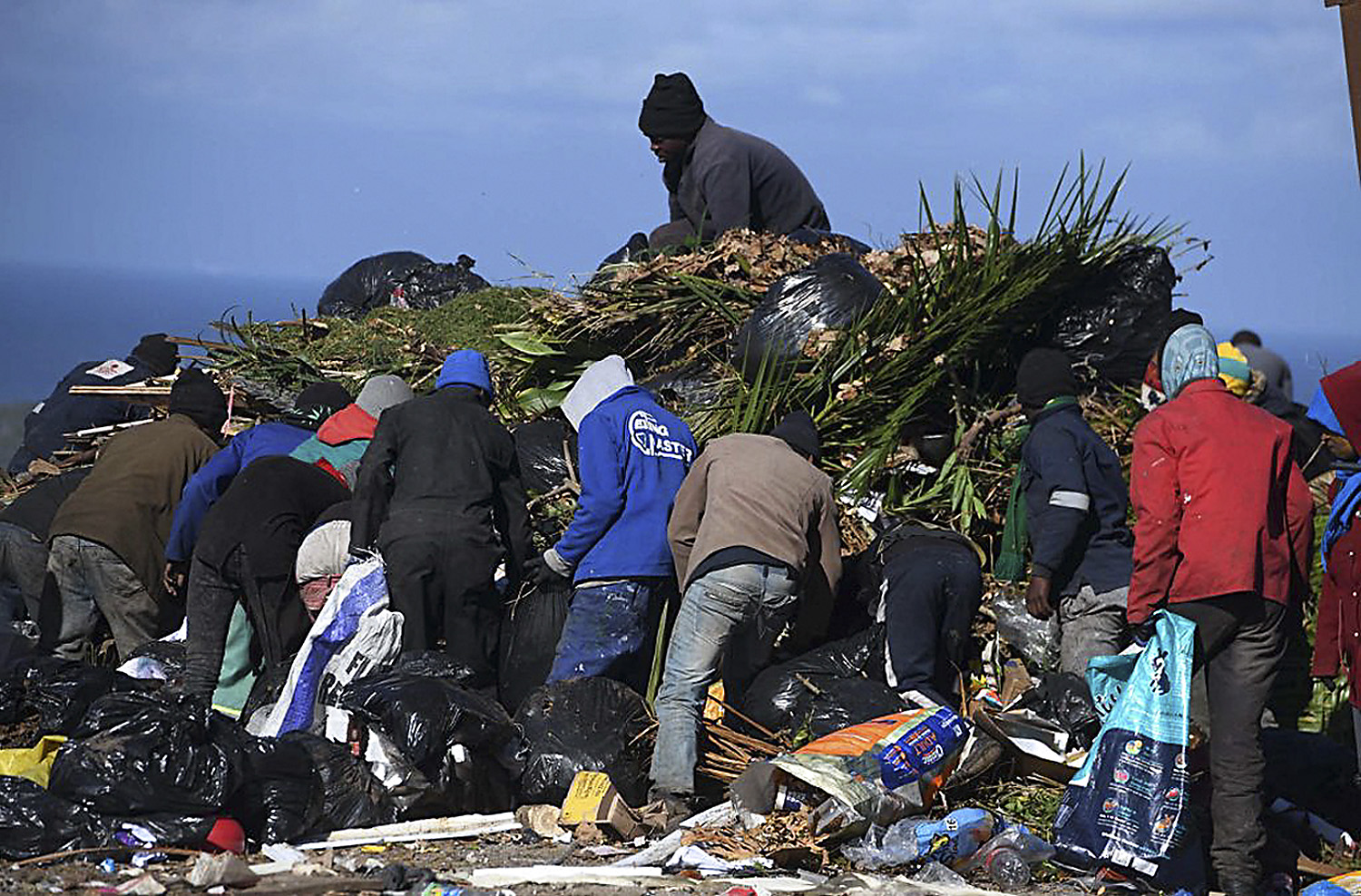
Waste pickers in search of recyclables to sell and food to eat. (Photo: Black Star/Spotlight)
Preiser says the current “recommendation [is] for waste from households where someone is in quarantine or in isolation [to] be double bagged before being put out with the domestic waste”. “If no one opens that double bag again, no problem,” he says.
“I would not worry too much about recyclables such as glass bottles and paper being picked up. Even if someone, for example, coughed into their hand and did not wash it before disposing of the bottle, it is unlikely that small amounts of infectious secretions would allow the virus to remain infectious. Used tissues and masks are a different problem,” he says. “If there is quite a large amount of secretions with a lot of virus, the ‘dirt’ may shield the virus from outside influences and allow it to remain infectious for longer.”
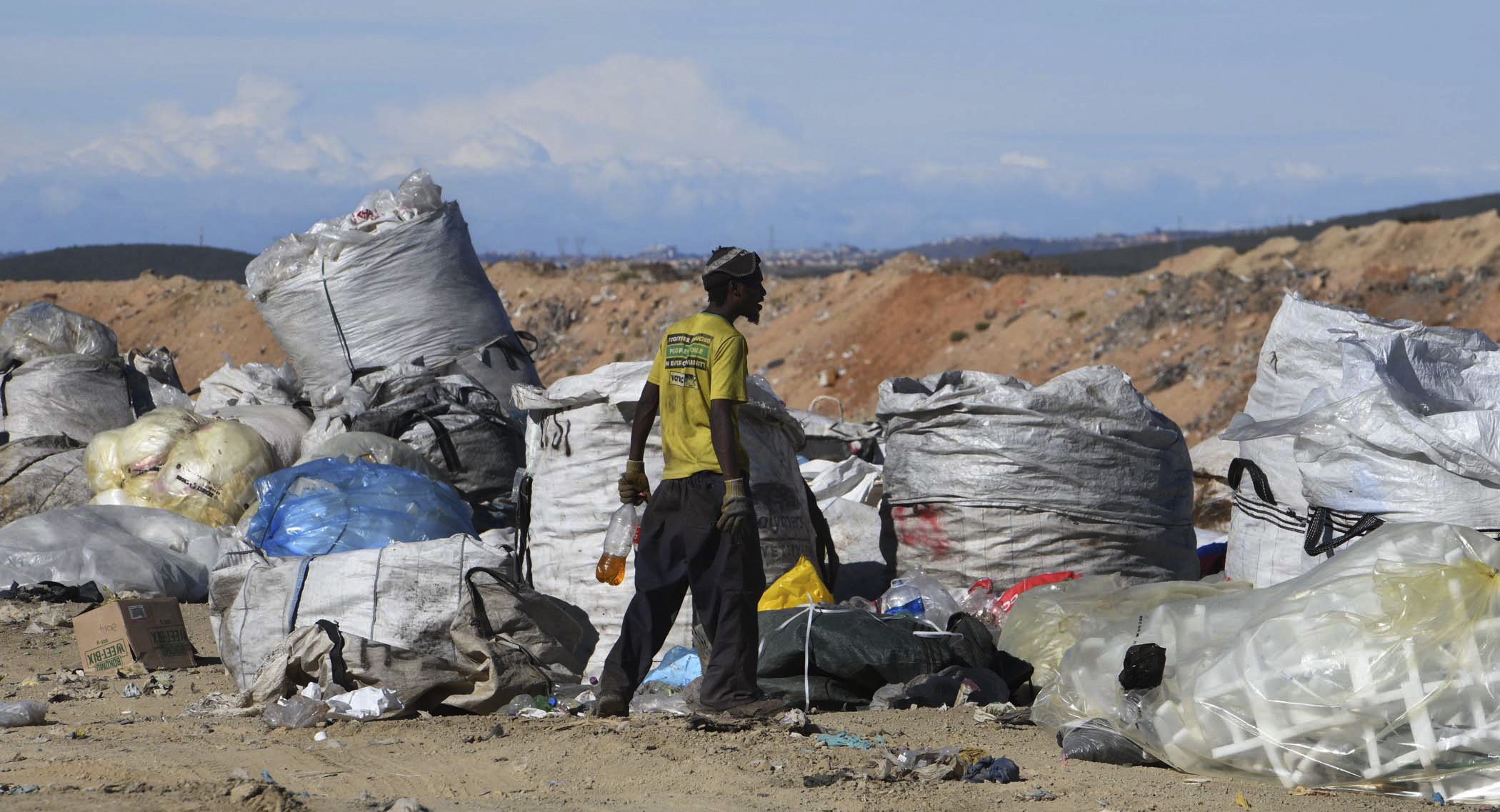
A man dressed in a yellow ANC T-shirt with ‘A better life for all’ written on it, guards massive bags of recyclables ready to be transported from the landfill site. (Photo: Black Star / Spotlight)
But Preiser notes none of this “should be much to worry about if those who handle this had gloves (not single-use medical ones, but proper working gloves that can be washed or cleaned after use), and could wash their hands regularly or use alcohol-based hand rub”. “Especially before drinking, eating or smoking after having handled rubbish.”
He also notes that “those going through household waste in search of recyclables are at risk in places where there is rampant community transmission”. “Formal waste services should have issued their staff with protective equipment and instructions. As they do not really handle the waste itself, but the bins and bags, their risk is then small. Nevertheless, there are frequent cases of Covid-19 among municipal solid waste staff,” Preiser says. He notes this may be due to staff contracting Covid-19 in the community and then transmitting it to their colleagues.
Unsafe even before Covid-19
For Zukisa Pikini of Uitenhage, the landfill site is the only way of surviving. “Without this dump, I won’t be able to feed my family. It’s better to come here and search for food instead of sleeping with an empty stomach. For the past three months, I have been working at the dump just to feed my 12-year-old boy and life is hard here. It is survival of the fittest. All of us, we eat rubbish and we constantly fight over it. Nothing is guaranteed,” she says.

Some call it home. Some waste pickers make the Uitenhage landfill site their home where they live in shacks of plastic and wood. (Photo: Black Star / Spotlight)
“I feel scared to work in this environment because I’m taking TB and HIV treatment and I also have one lung,” says Pikini. She tells Spotlight she registered for a food parcel, but has not received one. Pikini says she knows that she is putting herself at risk for contracting diseases. “I have no choice but to work for my kids.”
“We [the SAMRC] have done a study recently [2019] on the health of people who are living on landfill sites,” says Mathee. “It shows 90% of them are wearing some kind of PPE, but mostly garden gloves and because you are wearing gloves, it doesn’t mean you are completely safe. The study found informal waste workers at landfill sites are vulnerable as 37% of them had some kind of common mental disorder like anxiety, depression or stress.”
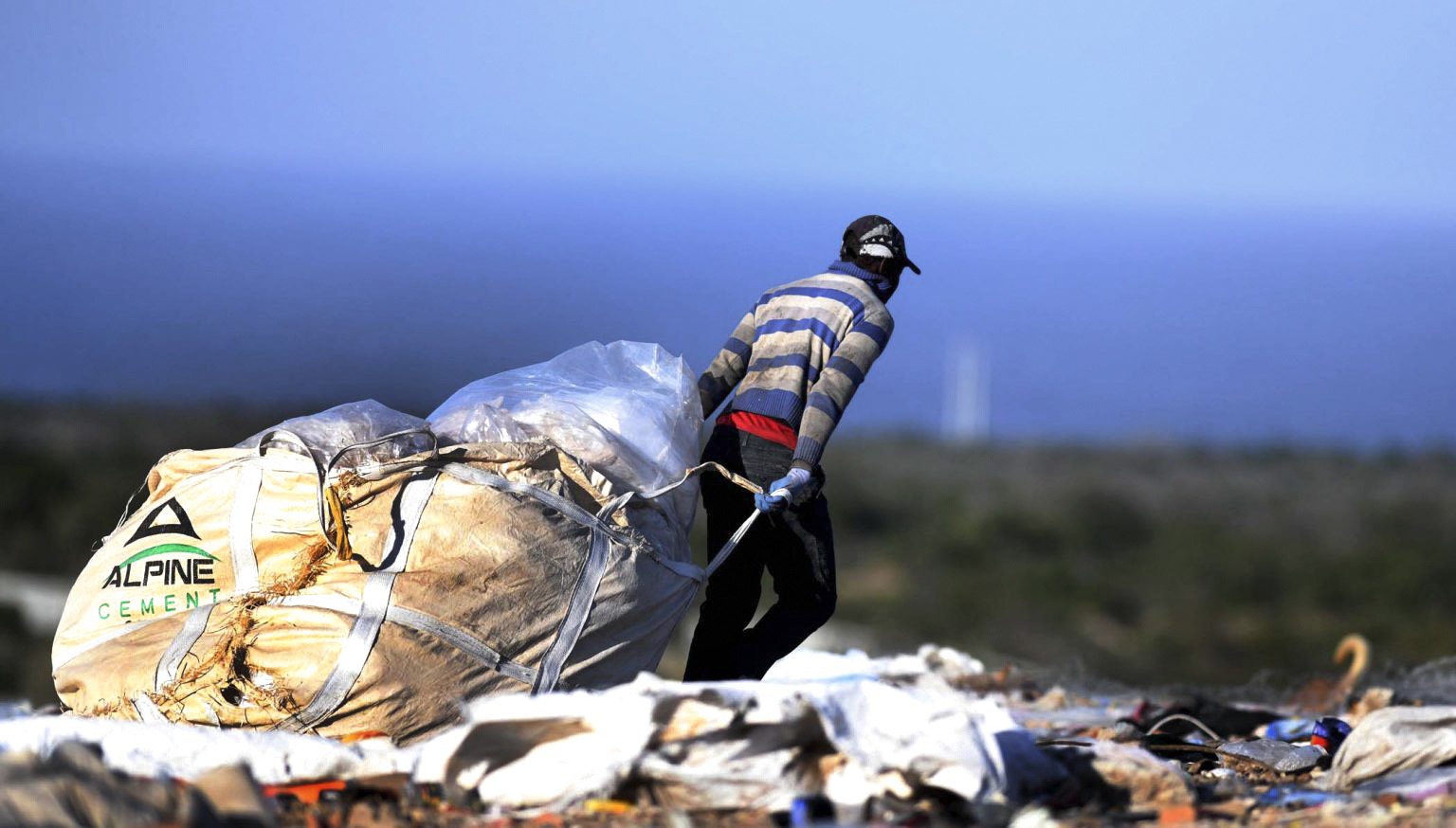
The daily toil. A waste picker makes his way home from the Arlington landfill site. (Photo: Black Star / Spotlight)
The study looked at the prevalence of respiratory health symptoms among waste recyclers at two sites in Gauteng. “A persistent cough was the most common symptom reported (46.8%), followed by breathlessness (19.6%) and rapid breathing (15.8%),” the study found.
“Many of them reported that they had injuries from rat bites, dog bites and some of the landfills have steep slopes, so they often fall,” says Mathee. “They also have very low access to healthcare. When they fall ill, they often do not go to clinics or hospitals for medical assistance. They just work throughout their illnesses,” she says.
“I know their challenge that they are poor and if it [PPE] is not supplied by somebody, they won’t be able to afford it themselves.” Mathee, however, still encourages waste pickers to wear PPE.
No PPE plans for waste pickers
The SAMRC study noted occupational health and safety awareness is important to minimise hazards faced by informal workers. “In addition, providing waste recyclers with the correct protective clothing, such as respiratory masks, and training on basic hygiene practices, could reduce the risks associated with waste sorting,” the study notes.
In a research briefing note, Dr Melanie Samson, Senior Lecturer in Human Geography at Wits University noted that in 2014, waste pickers saved the country’s municipalities up to R750-million in landfill airspace (airspace is the projected bank cubic yards of the landfill to be filled with waste as determined by survey and/or other engineering techniques).
Despite this, it appears that the Nelson Mandela Bay Metro has no immediate plan to provide waste pickers with PPE.
Mamela Ndamase, spokesperson for the Nelson Mandela Bay Metro, told Spotlight all municipal refuse collectors are “regularly provided with workwear to protect them”. On providing PPE to waste pickers, however, she said she will have to consult the relevant department on this matter.
Siyabulela Nciniba, 39, calls the Arlington dump the source of his livelihood. “We rely on the dump not only for food, but also for other necessities, despite potential health hazards. It is very dirty and on sunny days there is a bad smell, making it difficult to breathe,” he says. Nciniba tells Spotlight he is aware of the health risks. “Even right now I have a recurrent flu. I don’t know whether or not it is Covid-19.”
“Poverty leads us to put our lives in danger,” says Nciniba. “We are working without protective gear to guard us against Covid-19, and no one is providing us with protective gear because we are our own boss. Everyone here is afraid of this deadly virus, but we don’t have a choice but to work with or without them.”
Regulations and survival
Ndamase explains the regulations on municipal landfill sites. “Both municipal landfills are general sites, not hazardous waste sites. Access to both sites is restricted as per permit conditions. No sleeping is allowed on site. Our notice boards are clearly stating that any person inside the sites seen eating and sleeping after operation times, is trespassing.”
Ndamase says at the beginning of lockdown Level 5, waste pickers were made aware of the regulations. “[We] tried so many times to chase them out of the site. However, as the levels were relaxed, people found their way back to the site through the gaps in the fence. Public health officials are doing their best to educate and create awareness to all communities, including waste pickers,” she says.
When Spotlight visited both sites recently, there were several makeshift shelters made of plastic sheets and wood that people lived in. The shacks appeared to have been there for quite some time, contrary to municipal regulations.
“I came here to collect cardboard and other recyclable material but decided to stay on the site because I can’t afford transport money to travel daily from here to home,” says Asanda Tyala, 28, from Uitenhage, mother of a 13-year-old boy and two girls aged 14 and 10.
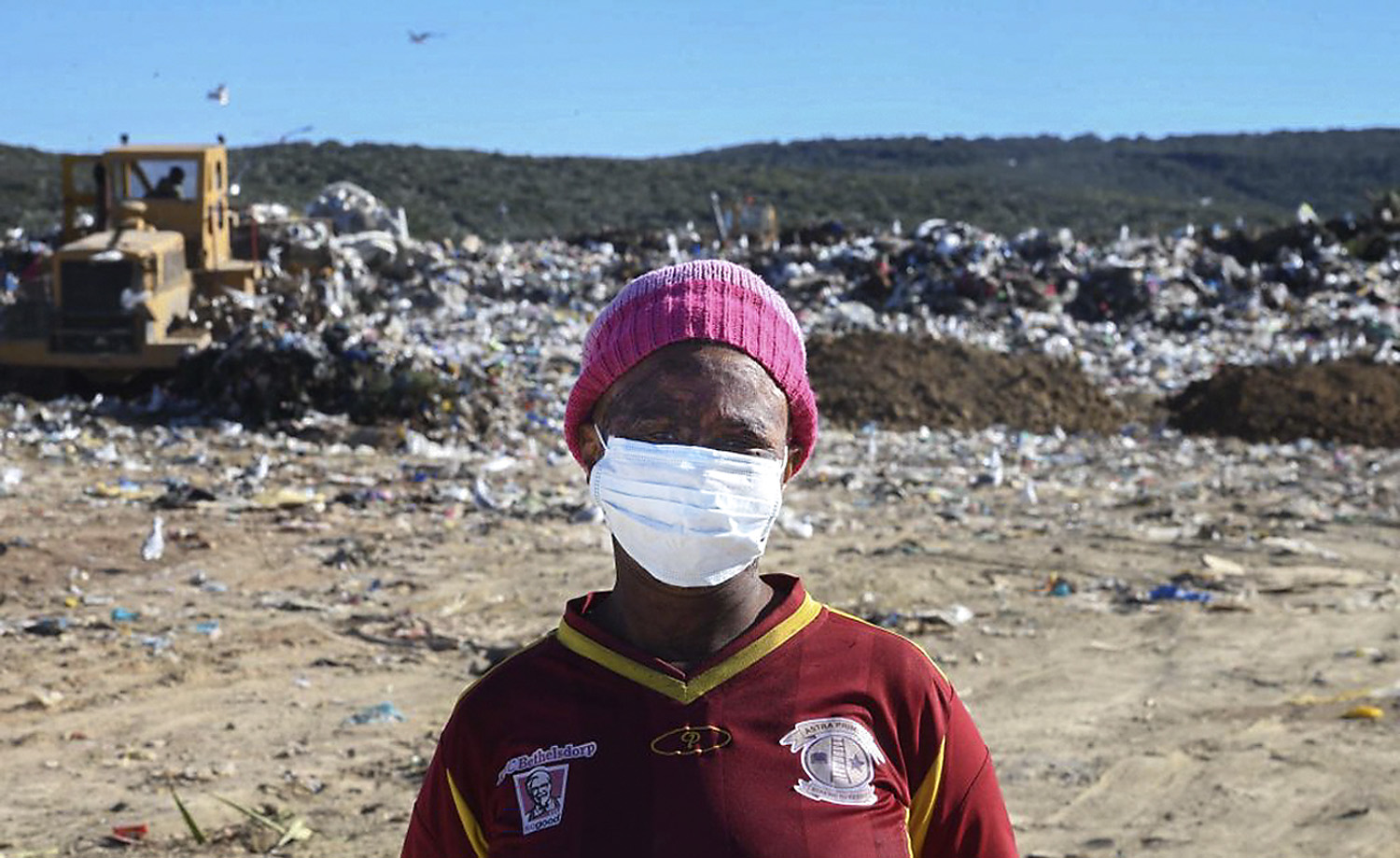
Asanda Tyala at the Uitenhage landfill. (Photo: Black Star/Spotlight)
“I collect waste to sell for food so that I can feed my children,” she says. “I used to be concerned about the unbearable smell. The smell doesn’t concern me anymore because I’m used to it. I have been breathing in this stench for three years, having no health problems,” she says. Tyala says on “good days”, she used to make R700 a day with her recycling, but since numbers of waste pickers increased with the lockdown, she hardly makes R300 a day.
Backbone of recycling industry
National coordinator of the South African Waste Pickers Association Simon Mbata, says waste pickers are the “backbone of the recycling industry, operating in the informal sector and are self-employed with no one to provide PPE”. “We call on government, private sector and civil society organisations to assist, support, fund and work holistically with waste pickers during this time and make it easy for waste pickers to have access to PPE,” says Mbata.
“We also call upon national government to make it mandatory for all citizens to separate their waste and phase out the mixed waste collection system. We believe that this should be the last generation of waste pickers working in landfills. We want to see all municipalities building material recovery facilities, run and operated by waste pickers. All this will go a long way in ensuring that waste pickers are also protected and practise good hygiene.”
Meanwhile, for most waste pickers, life remains difficult.
Shelton Tinarwo, 44, from Zimbabwe has been working at the Arlington landfill for the last five months. “During the beginning of lockdown, police and municipal security used to chase us away, but we kept coming back until they let us in. It is difficult for us who come from other countries to make a living. Locals always accuse us of taking their bread and butter, but without jobs, we will starve – and poverty knows no nationality.” DM/MC
This article was produced by Spotlight – health journalism in the public interest. Sign up for our newsletter.
"Information pertaining to Covid-19, vaccines, how to control the spread of the virus and potential treatments is ever-changing. Under the South African Disaster Management Act Regulation 11(5)(c) it is prohibited to publish information through any medium with the intention to deceive people on government measures to address COVID-19. We are therefore disabling the comment section on this article in order to protect both the commenting member and ourselves from potential liability. Should you have additional information that you think we should know, please email [email protected]"




 Become an Insider
Become an Insider